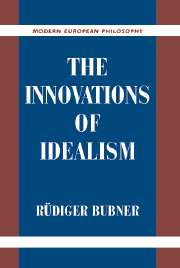11 - Is There a Hegelian Theory of Aesthetic Experience?
from AESTHETICS
Published online by Cambridge University Press: 06 August 2009
Summary
The question expressed in my title addresses a question located in the intermediate space between Hegel's philosophy of art and Kant's Critique of Judgement. And it thereby assumes an inevitably paradoxical appearance. For at first sight, it should be obvious that an aesthetic theory like Hegel's, oriented as it is to the structure of the work of art, will naturally neglect the analysis of the effect produced upon the subject by aesthetic phenomena and concentrate rather upon identifying the essential character of art itself. On this conception of aesthetic theory, there seems little place for the concept of aesthetic experience. On the other hand, one cannot straightforwardly claim that Kant's transcendental derivation of the judgement of taste from the reflective activities of the faculty of judgement itself provides a theory of aesthetic experience either. In order to address this question adequately, we must attempt, at least initially, to separate Kant's own approach from its predominantly epistemological context, and develop it somewhat further in the direction of a substantive definition of art. But then we shall also have to revise Hegel's decisive identification of the essence of art as the ‘sensuous appearing of the Idea’ if we are to discover traces of something like aesthetic experience within his own systematically expounded concept of art.
In the following remarks, I shall attempt just such a mutually illuminating analysis of the two theories.
- Type
- Chapter
- Information
- The Innovations of Idealism , pp. 216 - 230Publisher: Cambridge University PressPrint publication year: 2003



